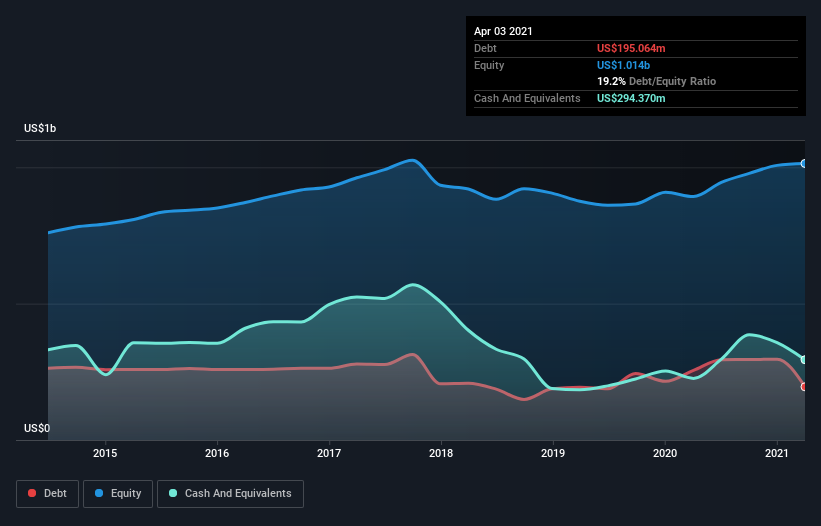- United States
- /
- Electronic Equipment and Components
- /
- NasdaqGS:PLXS
These 4 Measures Indicate That Plexus (NASDAQ:PLXS) Is Using Debt Safely

Warren Buffett famously said, 'Volatility is far from synonymous with risk.' So it seems the smart money knows that debt - which is usually involved in bankruptcies - is a very important factor, when you assess how risky a company is. We can see that Plexus Corp. (NASDAQ:PLXS) does use debt in its business. But should shareholders be worried about its use of debt?
What Risk Does Debt Bring?
Debt is a tool to help businesses grow, but if a business is incapable of paying off its lenders, then it exists at their mercy. Part and parcel of capitalism is the process of 'creative destruction' where failed businesses are mercilessly liquidated by their bankers. While that is not too common, we often do see indebted companies permanently diluting shareholders because lenders force them to raise capital at a distressed price. By replacing dilution, though, debt can be an extremely good tool for businesses that need capital to invest in growth at high rates of return. When we think about a company's use of debt, we first look at cash and debt together.
See our latest analysis for Plexus
What Is Plexus's Net Debt?
You can click the graphic below for the historical numbers, but it shows that Plexus had US$195.1m of debt in April 2021, down from US$255.3m, one year before. However, it does have US$294.4m in cash offsetting this, leading to net cash of US$99.3m.

A Look At Plexus' Liabilities
We can see from the most recent balance sheet that Plexus had liabilities of US$919.3m falling due within a year, and liabilities of US$303.6m due beyond that. On the other hand, it had cash of US$294.4m and US$625.0m worth of receivables due within a year. So its liabilities outweigh the sum of its cash and (near-term) receivables by US$303.5m.
Given Plexus has a market capitalization of US$2.76b, it's hard to believe these liabilities pose much threat. However, we do think it is worth keeping an eye on its balance sheet strength, as it may change over time. Despite its noteworthy liabilities, Plexus boasts net cash, so it's fair to say it does not have a heavy debt load!
On top of that, Plexus grew its EBIT by 43% over the last twelve months, and that growth will make it easier to handle its debt. There's no doubt that we learn most about debt from the balance sheet. But ultimately the future profitability of the business will decide if Plexus can strengthen its balance sheet over time. So if you're focused on the future you can check out this free report showing analyst profit forecasts.
Finally, a company can only pay off debt with cold hard cash, not accounting profits. Plexus may have net cash on the balance sheet, but it is still interesting to look at how well the business converts its earnings before interest and tax (EBIT) to free cash flow, because that will influence both its need for, and its capacity to manage debt. During the last three years, Plexus produced sturdy free cash flow equating to 60% of its EBIT, about what we'd expect. This cold hard cash means it can reduce its debt when it wants to.
Summing up
Although Plexus's balance sheet isn't particularly strong, due to the total liabilities, it is clearly positive to see that it has net cash of US$99.3m. And it impressed us with its EBIT growth of 43% over the last year. So is Plexus's debt a risk? It doesn't seem so to us. There's no doubt that we learn most about debt from the balance sheet. But ultimately, every company can contain risks that exist outside of the balance sheet. Be aware that Plexus is showing 1 warning sign in our investment analysis , you should know about...
At the end of the day, it's often better to focus on companies that are free from net debt. You can access our special list of such companies (all with a track record of profit growth). It's free.
If you’re looking to trade Plexus, open an account with the lowest-cost* platform trusted by professionals, Interactive Brokers. Their clients from over 200 countries and territories trade stocks, options, futures, forex, bonds and funds worldwide from a single integrated account. Promoted
New: Manage All Your Stock Portfolios in One Place
We've created the ultimate portfolio companion for stock investors, and it's free.
• Connect an unlimited number of Portfolios and see your total in one currency
• Be alerted to new Warning Signs or Risks via email or mobile
• Track the Fair Value of your stocks
This article by Simply Wall St is general in nature. It does not constitute a recommendation to buy or sell any stock, and does not take account of your objectives, or your financial situation. We aim to bring you long-term focused analysis driven by fundamental data. Note that our analysis may not factor in the latest price-sensitive company announcements or qualitative material. Simply Wall St has no position in any stocks mentioned.
*Interactive Brokers Rated Lowest Cost Broker by StockBrokers.com Annual Online Review 2020
Have feedback on this article? Concerned about the content? Get in touch with us directly. Alternatively, email editorial-team (at) simplywallst.com.
About NasdaqGS:PLXS
Plexus
Provides electronic manufacturing services in the United States and internationally.
Flawless balance sheet with solid track record.
Similar Companies
Market Insights
Community Narratives



